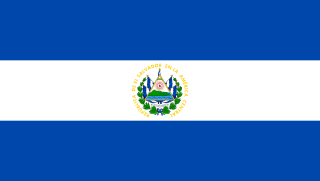
Flag of El Salvador (Source » Wikimedia)
Republic of El Salvador
- Capital » San Salvador
- Current Weather » BBC
- Current Time & Date
Facts
- Population » 6.3 million
- 2.1 million inhabitants live in the largest city and capital, San Salvador
- Language » Spanish is the official language
- Religion » Christianity
- Life expectancy » 68 years (men), 77 years (women)
- Currency » US dollar & Salvadoran colon
- Bitcoin (officially adopted as legal tender on 7 Sep 2021)
Geography
- Area » 21,041 sq km (8,124 sq miles)
- The country lies on the west coast of Central America, bordering the Pacific Ocean, Guatemala, Honduras, and Nicaragua
Maps
Notes
- National dish » Pupusa » a thick griddle cake or flatbread made with cornmeal or rice flour, similar to the Colombian and Venezuelan arepa. In El Salvador, it has been declared the national dish and has a specific day to celebrate it.
Climate
- El Salvador has two main seasons »
- Dry Season (November to April) is arid and warm with little rain.
- Rainy Season (May to October) brings with it a higher risk of tropical storms and hurricanes
- Weather Forecast »
Tourism
- Tourist visa is not required for Canadians
- To enter El Salvador, Canadians must purchase a tourist card, which costs US$10 and is valid for 30 to 90 days. Local officials determine the validity period of the card.
- Salvador Tourism Corporation
Events
- Holy Week » Semana Santa is a religious festival best experienced in San Salvador with street parades and performance art.
- Occurs in the week leading up to Easter Sunday.
- May » The Panchimalco Flower and Palm Festival offers up floral arrangements, music, and traditional dress and is celebrated nationwide.
- July » Fiesta Julias is celebrated through the month of July with parades and cultural events.
- August » Festival of El Salvador » San Salvador celebrates it’s Patron Saint with live music, parades, dancing, and religious ceremonies.
- August » Balls of Fire Festival » Held in Nejapa fire-throwers with elaborately painted faces perform on the streets.
- September 15 » Independence Day » Celebrating El Salvador’s independence from Spain in 1821 with parades and fireworks on the beaches
Overlanding
- Local vehicles are often overloaded and poorly maintained
- Streets tend to be narrow, with poor signage and lighting
- Look out for potholes and missing manhole covers
- Rural roads have wandering livestock and pedestrians
- Police checkpoints (retenes) are common, especially in and around San Salvador
- Criminals may assault travellers on isolated rural roads
- Avoid driving after dark
Safety & Security
- International Crisis Group
- Violent crime is a problem throughout the country
- organized street gangs are mostly responsible for this
- Be cautious when using ATMs. Criminals are known to observe, follow, and steal from people who had just made withdrawals
- Violence and political tensions in El Salvador remain high » The Guardian (June 2022)
- “El Salvador has one of the highest crime rates in Latin America. Violence between gangs is common and targets are usually rival gang members or the military and police. While most gang violence occurs away from tourists and visitors, no location is completely safe. Most visits to El Salvador are trouble-free but there have been isolated attacks on tourists including robberies, car-jackings and violent assaults.” UK (June 2022)
Emergency Phone Numbers
- Emergencies » 911
- Directory » 114
- National Civil Police » (503) 2202-0000
- Firemen » (503) 2527-7300
- Tourist Police » (503) 2511-8300 / 2511-8303
Government Advisories
Foreign Embassies
Media
This page was updated September 13, 2023
